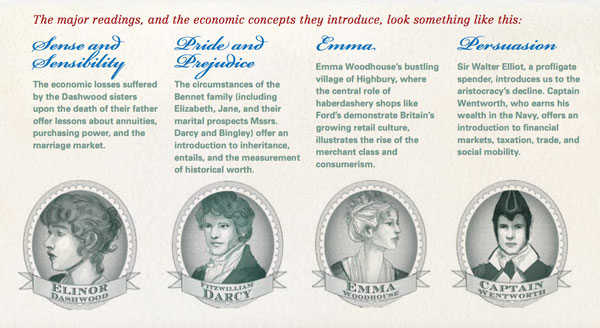It is a truth universally acknowledged that Jane Austen’s novels contain a wealth of commentary on the dramatic economic changes of her era.
University of Michigan undergraduates looking for a friendly and informative introduction to economics might not think to look for it in a course cross-listed in the English department, but they’d find it in at least one: Jane Austen and Economics.
Developed and taught by Kathryn Dominguez, professor of economics and public policy, and Adela Pinch, professor of English and women’s studies, the interdisciplinary course covers a wide range of economic concepts including productivity, scarcity, comparative advantage, and more.
Adela Pinch, who had taught a course on Austen for many years, recalls inviting Dominguez to offer a guest lecture translating Austen-era incomes and expenditures into today’s dollars. Reading in the course evaluations that a number of students felt it was one of the best parts of the class, she suggested they work together to develop a new interdisciplinary course.
Pinch, an expert in 19th century British literature, guides the literary discussions, while Dominguez, an internationally regarded macroeconomist, provides the monetary and economic context.
Along the way, students read excerpts from Adam Smith’s Wealth of Nations and John Stuart Mills’ Principles of Political Economy, as well as articles on the industrial revolution, gentlewomanly capitalism, and more.
While most of us think of Austen as a brilliant novelist who wrote enduring love stories brimming with social critiques, clever and resilient female leads, and ironic wit, Dominguez notes that Austen lived through a time of transformational political, social, and economic changes that worked their way into her plotlines.
Austen also experienced chronic money worries of her own, says Dominguez—worries that would make her highly sensitive to the importance of wealth, and the lack thereof, in one’s life prospects.
When one student suggests that the Bennet women might be labeled ‘gold-diggers’ today, Dominguez nods, but says that women’s limited job opportunities and property rights forced them to think that way.
“It’s going to make you cry how little [Austen] made off her six novels,” she tells the class. “She’s writing about sums of money that mattered a lot to her personally, as well as to the women in her books.”
Illustrations: Mary Winkler 
Below is a formatted version of this article from State & Hill, the magazine of the Ford School. View the entire Spring 2016 State & Hill here.
